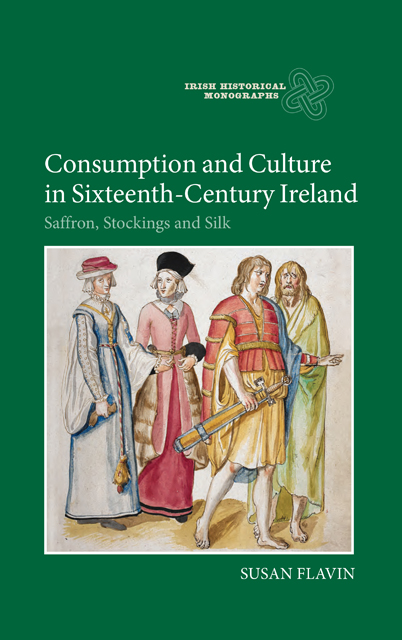Summary
In the sixteenth century, south-east Ireland and its extensive hinterland witnessed significant changes in consumption. These mirrored, in many ways, the sorts of changes occurring in the Pale, in England and across Europe during the period. While not vast in term of value, the progressively complex range of goods imported into Ireland demonstrates that, whether or not Ireland was as ‘backwards’ as many contemporaries felt, it was gaining access to the increasingly sophisticated and diversified range of consumer goods being produced and traded in England and mainland Europe at this time. Ireland was able to participate in an evolving European consumer culture during this period, even if it was not at the forefront of it.
This book has questioned the impact of a number of broad economic, social and political factors on the growing consumption of luxury goods in Ireland, particularly in the last quarter of the century. Of particular significance in this context has been the extent to which rising consumer imports were a function of English colonialism, as suggested by Thirsk. It would appear, however, that immigration from England was not the chief driving force of these changes, since the increasing diversification of commodity types does not map on to the chief periods of Elizabethan colonisation and conquest. The new ranges of items imported were predominantly for the use of pre-existing Irish ‘consumers’, rather than the settler population, and the factors driving these changes were rooted in the Irish economy and society.
Unfortunately, the dearth of evidence for this period in Ireland’s history makes the specific identification of these Irish ‘consumer’ groups almost impossible. Without detailed and reliable evidence for demographic change, wages, prices, ownership of goods, mercantile marketing strategies, credit arrangements, and so on, it is difficult to assess the extent and significance of this apparent ‘consumer boom’. It is certainly clear, however, that interest in new consumer goods extended beyond the elite in Irish society. The surviving wills and inventories of Cork citizens clearly show that the better-off townspeople, below the level of elite, could aspire to the ownership of very luxurious apparel and domestic furnishing and wares, but there is evidence that the demand for new goods in this period was beginning to extend even further down the social scale.
- Type
- Chapter
- Information
- Consumption and Culture in Sixteenth-Century IrelandSaffron, Stockings and Silk, pp. 243 - 249Publisher: Boydell & BrewerPrint publication year: 2014

